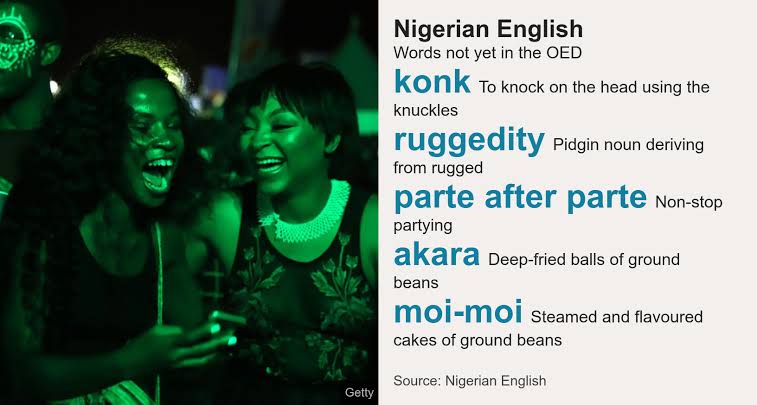Nigeria and Nigerians are known for their use of several slangs and new words. And as such, Oxford English Dictionary decided to update their latest dictionary version update with twenty nine Nigerian words.
In a blog post, Oxford English Dictionary, said some of the Nigerian words are borrowed while others are coinages.

Here is a list of the new Nigerian words and senses added to the Oxford English Dictionary in the latest update:
Agric, adj. and n.: “Of, relating to, or used in agriculture; = agricultural adj. Now chiefly West African.”
Barbing salon, n.: “A barber’s shop.”
Buka, n.: “A roadside restaurant or street stall with a seating area, selling cooked food at low prices. Cf. bukateria n., mama put n. Frequently as a modifier…”
Bukateria, n.: “A roadside restaurant or street stall with a seating area, selling cooked food at low prices. Cf. buka n., mama put n.”
Chop, v.6, Additions: “transitive. Ghanaian English and Nigerian English. To acquire (money) quickly and easily. Frequently in negative sense: to misappropriate, extort, or…”
Chop-chop, n.2: “Bribery and corruption in public life; misappropriation or embezzlement of funds. Also as a modifier.”
Danfo, n.: “A yellow minibus that carries passengers for a fare as part of an informal transport system in Lagos, the largest city in Nigeria. Also as a…”
To eat money, in eat, v., Additions: “Now chiefly Nigerian English and East African. to eat money: to acquire money dishonestly; to misappropriate, extort, or embezzle funds. Cf. chop v.6…”
Ember months, n.: “The final four months of the calendar year (September to December), esp. considered together as a period of heightened or intense activity.”
Flag-off, n.: “The moment at which a race, esp. a motor race, is flagged off (see flag v.4 additions a); the start of a race. Now chiefly Indian English and…”
Flag, v.4, Additions: “to flag off. transitive (usually in passive). To direct (a driver) to start a motor race, esp. one in which the competitors start at intervals, by…”
Flag, v.4, Additions: “to flag off. transitive. Indian English and Nigerian English. In extended use: to start (an event or undertaking).”
More Words On The Dictionary
Gist, n.3, Additions: “Nigerian English. Idle chat, gossip. Also: an instance of this, a rumour or piece of gossip.”
Gist, v.2: “transitive. To reduce (a text, document, etc.) to its essence or gist; to condense, summarize, or précis.”
Guber, adj.: “Of or relating to a governor or governorship; = gubernatorial adj.”
Kannywood, n.: “The Nigerian Hausa-language film industry, based in Kano; Kano regarded as the centre of this industry. Cf. Nollywood n.”
K-leg, n.: “In singular and plural. A condition in which one or both of a person’s knees are turned inwards, resulting in a noticeable gap between the feet when…”
Mama put, n.: “A street vendor, typically a woman, selling cooked food at low prices from a handcart or stall. Also: a street stall or roadside restaurant run by…”
Next tomorrow, n. and adv.: “The day after tomorrow.”
Non-indigene, adj. and n.: “Not native. In later use chiefly West African: belonging to an ethnic group considered not to be indigenous to a particular area.”
Okada, n.: “In Nigeria: a motorcycle which passengers can use as a taxi service.”
To put to bed in put, v.: “West African. to put to bed: to give birth. Also: to give birth to (a child).”
Nigerian Words
Qualitative, adj., sense 3: “West African. Of high quality; excellent.”
To rub minds in rub, v.1: “ rub minds (together): (of two or more people) to consider a matter jointly; consult and work together; to confer. Similarly to rub our (also…”
Sef, adv.: “Used for emphasis after a statement or rhetorical question, often expressing irritation or impatience.”
Send-forth, n.: “A celebration or event to mark a person’s departure; a send-off. Frequently as a modifier, as send-forth ceremony, send-forth party, etc.”
Severally, adv., Additions: “East African and West African. On several occasions; repeatedly.”
Tokunbo, adj.: “Denoting an imported second-hand product, esp. a car.”
Zoning, n., Additions: “Nigerian English. The system or practice of allocating nominations for certain political offices to candidates from particular regions, as part of an…”
A statement from Oxford English Dictionary’s World English Editor, Danica Salazar said ”The majority of these new additions are either borrowings from Nigerian languages, or unique Nigerian coinages that have only begun to be used in English in the second half of the twentieth century, mostly in the 1970s and 1980s,”
Also, ‘next tomorrow’ is one of the new entries in the dictionary and the expression is regarded as the oldest among the over 25 uniquely Nigerian words/expressions.

